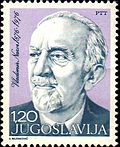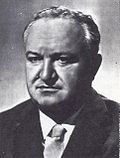| Speaker of the Croatian Parliament | |
|---|---|
| Predsjednik Hrvatskog sabora | |
 | |
| Croatian Parliament | |
| Style | Mr Speaker (when addressed in the Sabor) |
| Type | Presiding officer |
| Seat | Sabor Palace, Zagreb |
| Nominator | Political parties |
| Appointer | Croatian Parliament traditionally appointing nominee of the largest party |
| Term length | Contemporaneous to legislative period |
| Constituting instrument | Constitution of Croatia |
| Formation | 30 May 1990 |
| First holder | Žarko Domljan |
| Deputy | Deputy Speakers of the Croatian Parliament |
| Salary | € 5314 monthly [1] |
 |
|---|
The speaker of the Croatian Parliament (Croatian : Predsjednik Hrvatskog sabora, literally the president of the Croatian Parliament) is the presiding officer in the Croatian Parliament, Croatia's legislative body.
Contents
Under Article 97 of the constitution of Croatia, the speaker of the Croatian Parliament is the only constitutional deputy to the president of Croatia and serves as acting president if the elected president vacates the office before the expiration of the five-year presidential term due to either death, resignation or removal from office (as determined by the Constitutional Court). In this case an early presidential election must be held within 60 days of the vacancy in the presidency having occurred and the speaker shall serve as acting president until the newly elected president is sworn in for a full five-year term of office.
Under the same article of the Constitution, the president of Croatia may unilaterally choose to temporarily delegate authority to the speaker of the Parliament for shorts periods of time, such as whenever the president is not present in the country, is ill, or is on vacation, until the president wishes to fully resume authority once again. However, in case of longer periods of the president's illness or incapacitation, and especially in those cases when the president is not able to delegate authority to speaker, the responsibility of determining when a speaker should assume or renounce temporary authority rests upon the Constitutional Court, which acts upon the recommendation of the government of Croatia.
The incumbent speaker of the Croatian Parliament is Gordan Jandroković of the Croatian Democratic Union, having taken office on 5 May 2017 following the resignation of the previous speaker.

















